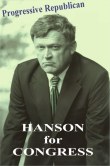
Burton Hanson for Congress
GOP Primary - MN 3rd District
|
Strength and Prosperity Through Peace
|
Improving Elections
I may be the only candidate for Congress in the country who believes that both contributions and endorsements are compromising and even corrupting of a candidate.
By "endorsements" I mean, primarily, the kind that candidates seek and welcome. An example is the endorsement my opponent received recently from the Minnesota Peace and Police Officers Association. According to a story by Rachel Stassen-Berger in the Pioneer Press on 08.07.2004, the group, which endorsed Rep. Kennedy (R - 6th Dist.) last time around, endorsed Patty Wetterling, his DFL opponent, this time around, because a) the organization sent letters to all eight of Minnesota 's Congressional incumbents, b) Kennedy didn't respond seeking the endorsement, c) "Kennedy, unlike the other members of Minnesota's congressional delegation, has been unwilling to take the time to sit down with his group's staffers and members and discuss law enforcement issues in detail," and d) "This is not based on whether or not Kennedy is strong on the issues." The organization apparently endorsed my opponent because he requested the endorsement in response to the organization's letter and, presumably, in the past he's been willing to sit down, etc., with the group's staffers and members.
While I recognize and support the constitutional right of people to organize according to their interests and to endorse and otherwise support candidates, I will not seek or accept any endorsements, by groups or individuals, of my candidacy this year or of any future candidacies. That doesn't mean that, if elected, I won't sit down with representatives of interest groups to hear their concerns, but I won't give them preference over individuals seeking a hearing. Any action I take with respect to any legislative matter will be based on my assessment of the matter's merits, not on whether this group or that group supports it and not on the likely partisan political ramifications of my action.
Similarly, I will neither seek or accept monetary contributions from either interest groups or individuals.
I'm not naive enough to believe that my position is practical, but look where the "practical" has gotten us in this area.
At heart, I guess, I'm an idealist -- and, perhaps, even an optimist. I foresee the day when any candidate, regardless of his or her economic position or connections, will be able to file for office and receive from voters a fair and informed consideration of the candidacy on the merits, without the need for the candidate's and his supporters' spending (wasting) significant sums of money on vacuous, or even nasty, advertising, sloganeering, and name-calling. How might this political fantasy come about? First, by a commitment by candidates to trying it. Second, by a commitment by the print media, TV and radio newscasters, etc., to providing real and in-depth coverage of the campaigns on the issues rather than on silly matters such as "who's ahead" in "the horse race" and who's likely to win. Third, voters need to understand that responsible citizenship involves something other than watching TV commercials and voting the party line. Fact is, the way elections are conducted now, no one -- certainly not the typical voter -- wins.
Copyright (c) 2004 by Burton Randall Hanson. Prepared & published by candidate on his own behalf and at his own expense. Candidate may be reached by e-mail at burtonhanson@burtonhanson.com. Candidate does not solicit or accept contributions or endorsements.